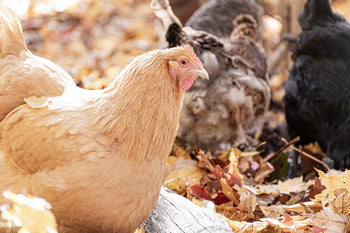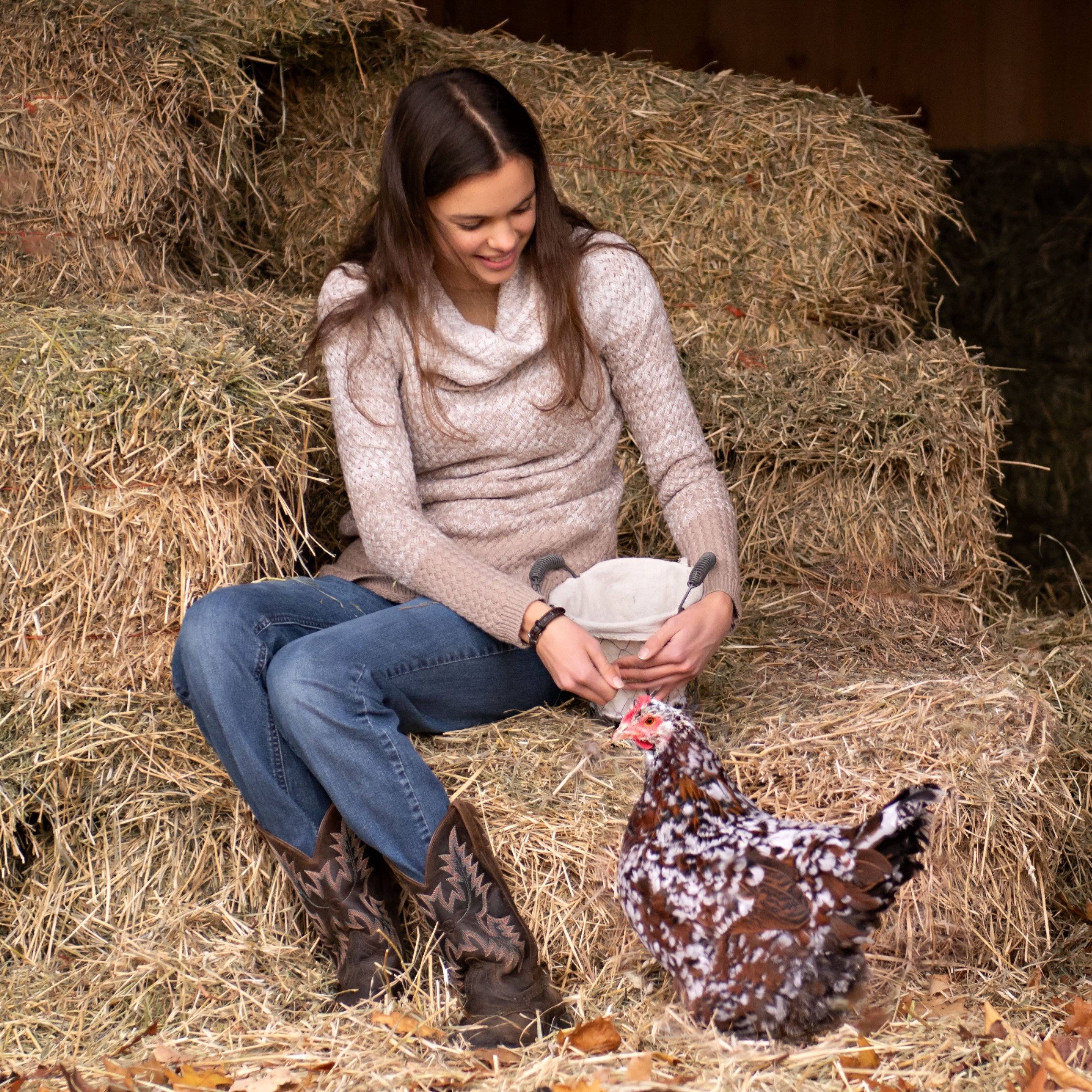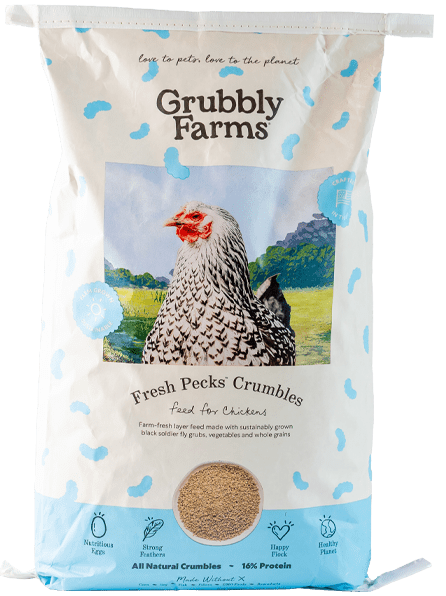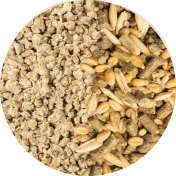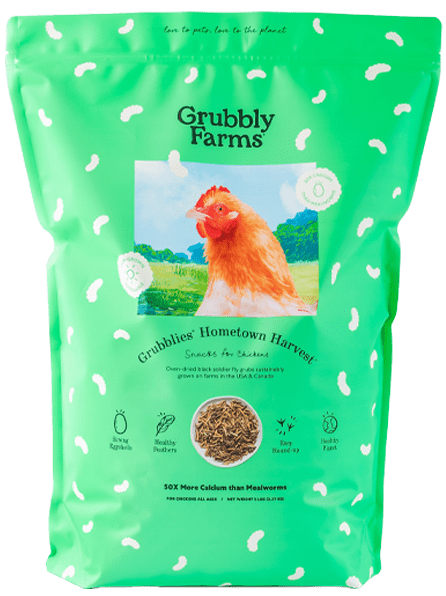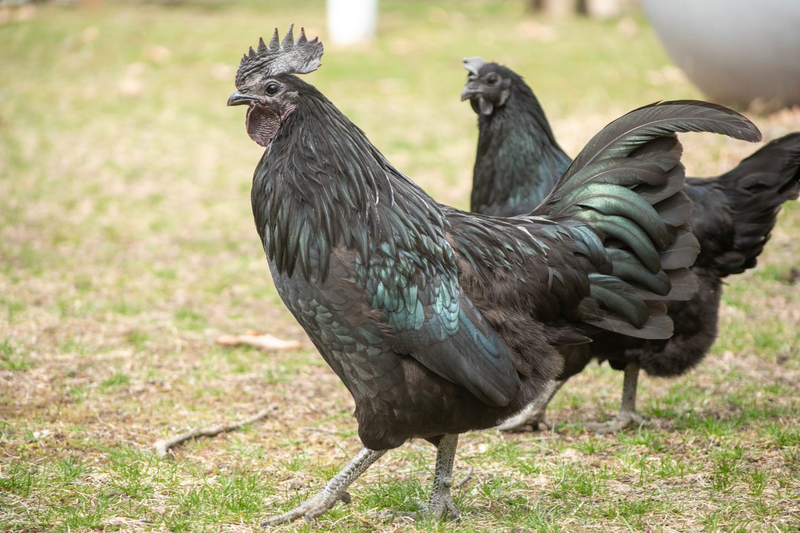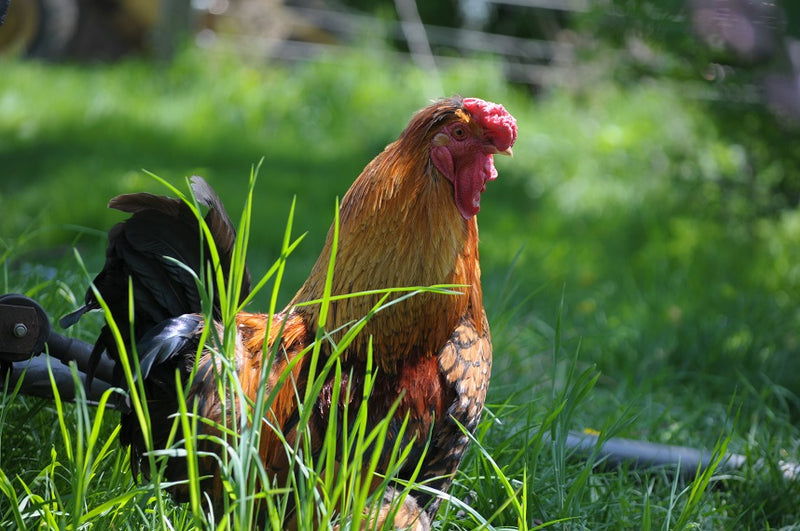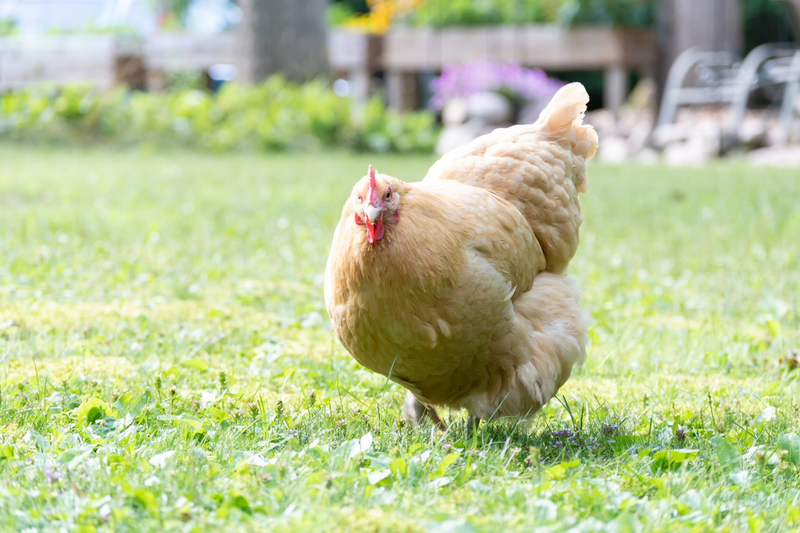When choosing any pet, whether it be cats, dogs, or chickens, picking out the right breeds is important for the health and happiness of your pet. In the poultry world, there are thousands of different chicken breeds to choose from. Picking out just a few breeds for your backyard can be tough! However, with so many options to pick from, you are bound to find more than one breed that will be a perfect fit for your backyard.
What to Consider When Looking for a Chicken
There are several different factors to consider when picking out the right chicken breeds for your backyard. Choosing the right breeds will make caring for your flock easier and keep your chickens healthier. Whether you’re starting your first backyard flock or adding to your existing flock, consider these 7 factors when selecting a new chicken:
Production Purpose
Chickens are best known for what they can produce: eggs and meat. Different chicken breeds excel at different purposes. When choosing chicken breeds for your flock, evaluate what you want their main production purpose to be.

1. Eggs
All hens lay eggs. However, different breeds will lay eggs at varying degrees of proficiency. Some breeds only lay seasonally, others will lay sporadically, and your best egg layers will lay consistently during the normal laying seasons. All hens will be affected by factors that inhibit egg production, such as aging, molting, and stress.
Chicken breeds that are considered ‘laying breeds’ have these common characteristics:
- lay a large number of eggs per year (250-300 egg per year)
- have small bodies
- begin laying at 4-5 months of age
- not inclined to brood
- often have flighty personalities
Chickens that are good layers are usually small bodied, as more energy is put into laying eggs rather than building muscle mass. Good layers mature quickly and are unlikely to brood (hatch and raise chicks).
Hybrid vs Purebred
Laying breeds can further be divided into hybrid laying breeds and purebred laying breeds. Hybrid laying breeds have been developed from a mix of chicken breeds for the sole purpose of high egg production. These breeds often lay prolifically for the first 2-3 years of their life, then they dramatically decrease in egg production. Due to their prolific laying, hybrid laying breeds are more prone to reproductive-related ailments. Since hybrid breeds are a mix, they will not breed true and are not ideal if you want a flock that will produce offspring with the same qualities as the parents.
Purebred laying breeds have pure bloodlines. They breed true and are great for raising a sustainable flock, or one that can reproduce on its own. While many purebred laying breeds were developed for egg laying, they were not bred for laying as prolifically as the hybrid breeds. As a result, purebred chicken breeds often lay well into old age and are less prone to reproductive ailments.
Quick tip, here are our favorite 10 Best Egg Laying Chicken Breeds!
2. Meat
If you are interested in putting wholesome, ethically raised meat on your table, you may be more interested in chickens developed for meat production. Meat chicken breeds have these characteristics:
- grow and feather rapidly
- reach target weight in minimum time
- are broad-breasted
- have white feathers for clean picking
Meat chicken breeds are large bodied and often very poor layers. The goal with most meat chicken breeds is to have them mature as fast as possible to cut down on feed expenses but still yield plenty of meat.
Hybrid vs Purebred
As with laying chickens, meat chickens can also be hybrids or purebreds. Hybrid meat chickens have been commercially developed for the fastest maturing time and rapid weight gain. These breeds are a mix and will not breed true, but they have an excellent feed to meat conversion ratio. However, they often mature so quickly that natural instincts, such as mating, dust bathing, or even simply moving around becomes difficult for them.
Purebred meat chicken breeds have pure bloodlines. They often mature slower and require more time and feed to reach market weight. However, since they mature at a more natural rate, purebred meat chickens can usually perform instinctual behaviors like mating and foraging. They are not as prone to rapid-development related health issues and often produce more flavorful, richer meat.
3. Dual-Purpose
To get the best of both worlds, you may consider dual-purpose chicken breeds. Dual-purpose chicken breeds won't lay as well as laying breeds or grow as fast or as large as meat birds, but they can provide you with both eggs and meat. The hens are often decent layers and the cocks usually mature into big enough birds for sustainable butchering.
Some dual-purpose chicken breeds lean more towards good layers while other breeds lean more towards good meat birds. Dual-purpose chicken breeds are often either heritage chicken breeds or sex-linked breeds. Heritage chicken breeds will breed true and make great birds for raising a sustainable flock. Sex-link chicken breeds won’t breed true, but they are often more prolific layers while still maturing into heavy enough birds that can also supply meat for the table.

4. Temperament & Personality
Different chicken breeds have different temperaments and personalities. While there will be differences even within a breed, certain breeds are known for certain characteristics. When choosing chickens for your backyard, you’ll want to consider these temperament factors:
Confinement - Some chicken breeds adapt to confinement better than others. If you are raising an urban flock with limited space, choosing chicken breeds who don’t mind confinement is ideal. Surprisingly, some of the biggest chicken breeds are the most content in confined environments. Just make sure you have plenty of coop and run space so they can still move around!
Docile chicken breeds and those with heavy leg feathering or large crests are often well suited for limited-foraging situations. Heavily feathered feet and large crest feathers can make foraging and predator awareness more difficult, and both of those activities are more important for free-range flocks.
Noise - If you live close to your neighbors, choosing quiet chicken breeds will be essential. All chickens make noise, and all roosters will crow. If a quiet flock is absolutely necessary, avoid getting roosters. Hens can still make considerable noise, however their noises are often not as high-pitched or frequent as a rooster crowing. There are some chicken breeds that are known to be noisy and should thus be avoided in low-noise situations:
- Ancona
- Cubalaya
- Leghorn
- Modern game
- Old English game
- Spanish
- Andalusian
- Cornish
Activity - Chickens who are alert and active will be better suited for free-range situations or environments where they have plenty of space to move around and forage. Breeds who are more laid-back and less active will be easier to contain. Flighty chicken breeds will need high fencing in order to keep them contained and prevent them from wandering. Here are some chicken breeds who are known to be flighty and active:
- Ancona
- Andalusian
- Campine
- Fayoumi
- Hamburg
- Lakenvelder
- Leghorn
- Old English game
Foraging - Foraging is an instinct for all chickens. However, some breeds are more closely related to their Red Jungle Fowl ancestors and have stronger instincts to forage. Those who are good foragers and allowed to forage will be able to supplement their diet from natural sources. They may even be able to source all of their own food if given the opportunity. Foraging breeds are usually very active, but they make good low-maintenance breeds who can source their own food when given the chance.
Broodiness - Broodiness is another instinct that is stronger in some chicken breeds than others. In commercial strains of chicken breeds, the broody instinct has all but been bred out to prioritize egg laying or meat production. When a hen goes broody, she wants to set on eggs and hatch chicks. She will stop laying to prepare for the task of brooding and raising her young. This instinct is extremely helpful if you want to raise a sustainable flock that will reproduce naturally. Some breeds that are known to make good broody mothers include:
- Orpingtons
- Silkie
- Aseel
- Cochin
- Australorp
Friendliness - A friendly personality is a must-have when raising chickens as pets or when kids are involved! Large, heavy chicken breeds tend to be calmer and have friendly personalities. In most any chicken breed, the cocks will tend to be more assertive than the hens. However, even cocks can be sweet and friendly when they are handled and raised kindly from a young age. Just make sure you choose chicken breeds who are known to be calm, docile, or friendly when picking out your pet chickens. Chickens bred for the historical sport of cockfighting are aggressive and should not be considered if you want a friendly flock.
Check out these 5 Friendliest Chicken Breeds!
5. Hardiness: Climate, Zone, and Environment
Evaluating your climate, zone, and environment is essential when choosing the right breeds for your backyard. Choosing chickens that suit where you live will make raising your flock easier and will help keep your chickens healthy.
If you live in a region that experiences cooler weather or longer winters, choosing cold hardy chicken breeds will be important. Cold hardy chicken breeds are less prone to cold stress and are more suited to handling cold temperatures. They often have lots of down, thick body feathers, small combs, and little or no wattles. Chicken breeds in the American, English, or Asiatic breed classes are usually cold hardy.
If you live in a region that experiences warmer weather and hot summers, choosing heat tolerant chicken breeds will be important. Heat tolerant chicken breeds are less prone to experiencing heat stress. They often have large combs and wattles to help with heat dissipation. Heat tolerant chicken breeds are small-bodied and tightly feathered. Chicken breeds with frizzle feathers are more suited to warm climates than cold climates since their curled feathers don’t trap heat very well. Chicken breeds in the Mediterranean breed class are often heat tolerant, as are Game breeds and many bantams.
6. Available Space
When choosing a breed for your backyard flock, consider the amount of available space you can give to your flock. Chickens need space, and the more space they can have, the easier it will be to raise a healthy and happy flock. Large chicken breeds will need more coop and run space, but they are not as active and can adapt to confinement happily. Active or flighty chicken breeds need lots of space to stay mentally stimulated and content. They will also appreciate more vertical space to accommodate their tendency to fly.
The size of your flock will be limited by the amount of space you have and what chicken breeds you get. If you have a certain amount of space in the chicken coop and run, you will be able to have more small, light chickens than heavy, large breeds in any given amount of space.
7. Size
Chickens can be categorized into two main sizes: standard chickens and bantam chickens. Standard chickens can further be divided into heavy standard breeds and light standard breeds. Heavy standard breeds are very large and require more coop space. Light standard chicken breeds are smaller-bodied and tend to be very good flyers.
Bantam chickens are basically miniature chickens. They are usually one-fifth to one-fourth the size of a standard chicken. Many standard chickens have bantam counterparts. However, there are also true bantam breeds who have no standard counterpart.
Bantam chickens eat less and require less space. They are a good option for situations where space is limited. However, bantams are not the best egg layers and their small bodies make them poor meat birds. Nonetheless, you can expect to get a decent amount of small eggs from bantam hens, especially from bantams who are counterparts to standard size laying breeds.
8. Health Concerns
All chickens are susceptible to any of the various poultry ailments and parasites. However, some chicken breeds are hardier than others. Genetics often plays a big role in how resistant a chicken is to disease. Good management and a nutritious diet can help any chicken stay healthy too.
Hybrid chicken breeds can be more prone to health issues. In their creation, the focus was on making high-production birds rather than maintaining disease resistance or a strong immunity. High production breeds are also more prone to reproductive related ailments due to the stress production puts on a chicken’s body.
Heritage chicken breeds tend to be more disease resistant. However, heritage chickens still need to be well-bred and cared for in order to stay healthy. Well-bred heritage chicken breeds will have stronger immune systems. They are also often hardier and less prone to reproductive ailments. For example, the Egyptian Fayoumi is one chicken breed that is well-known for having disease resistant genetics.
If you live in a colder climate, you should consider the risk of frostbite when choosing breeds for your flock. Chickens with large combs and wattles are more prone to frostbite. Choose chicken breeds with small combs and little or no wattles to avoid the risk of frostbite.
9. Availability
While availability is certainly a factor when choosing chicken breeds for your flock, it is by no means a limiting factor! Farm stores, hatcheries, and breeders or farms are just a handful of the most common places to look for different chicken breeds.
Farm stores usually have the most limited selection of chicken breeds to choose from. They source their chicks from hatcheries and try to select the most popular breeds that will sell. However, in some cases you may be able to special order breeds through your local farm or feed store.
Hatcheries supply small farm and feed stores with chicks, but they often will have an online website you can shop from as well. Shopping from online hatcheries will give you the widest selection of chicken breeds to choose from. However, hatcheries tend to focus on breeding chicks for quantity over quality, so you may not end up with breed standard or show quality birds. You should also consider order minimums and shipping factors when buying chicks online.
Breeders and small farms are another option if you are looking for rare or heritage breeds that are hard to find. You may also choose to support breeders or small farms who put more time and effort into preserving the genetics of a certain breed or breeding quality birds. Breeders and small farms often have a limited selection of breeds since they usually only specialize in one or a couple chicken breeds. They may also only sell chicks during certain months, so do your research upfront. Their chicks will usually be more expensive due to the time and effort that goes into selectively breeding chickens.
Common Backyard Chicken Breeds

Rhode Island Red
Known for their excellent egg production and hardiness, Rhode Island Reds are a popular choice among backyard chicken keepers. They have a friendly temperament and are good for both eggs and meat.
- Purpose- meat and eggs (brown, 250-300 per year)
- Size- standard and bantam
- Temperament- good forager, generally docile
- Hardiness- heat tolerant, cocks have large combs prone to frostbite

Plymouth Rock
Plymouth Rocks are best known for their barred variety, often called Barred Rocks. Barred rocks have black and white striped feathers that give them a unique and dazzling appearance. They are friendly, cold-hardy, and dependable layers of brown eggs.
- Purpose- meat and eggs (brown, 200 per year)
- Size- standard and bantam
- Temperament- good forager, generally docile
- Hardiness- heat tolerant, cold hardy, cocks have large combs prone to frostbite

Buff Orpington
Orpingtons are known for their docile and friendly nature. Buff Orpingtons are the most popular variety as they have beautiful buff-colored feathers. They are good layers of large brown eggs and are also cold hardy.
- Purpose- meat and eggs (brown, 110-160 per year)
- Size- large standard and bantam
- Temperament- good forager, docile and friendly, hens will brood
- Hardiness- cold hardy, cocks have large combs prone to frostbite

Leghorn
Leghorns are prolific layers of white eggs and are known for their active and alert disposition. They can be somewhat flighty but are excellent egg producers. The most common variety are white Leghorns, who also happen to be the most prolific, purebred layers.
- Purpose- eggs (white, 300 per year)
- Size- light standard and bantam
- Temperament- good forager, flighty
- Hardiness- heat tolerant, cocks have large combs prone to frostbite

Ameraucana & Easter Eggers
Ameraucanas (purebred) and Easter Eggers (hybrid) are popular for their blue and greenish-colored eggs. Both breeds are friendly and come in numerous varieties. Ameraucanas and some Easter Eggers have unique, tufted facial feathers called ‘muffs’ and a ‘beard’.
- Purpose- meat and eggs (blue, green, pink)
- Size- standard and bantam
- Temperament- generally docile, good foragers
- Hardiness- heat tolerant, cold hardy

Wyandotte
Wyandottes come in various colors and are known for their cold-hardiness and egg-laying abilities. They have a calm temperament.
- Purpose- meat and eggs (brown, 200 per year)
- Size- large standard and bantam
- Temperament- good forager, generally docile
- Hardiness- cold hardy

Silkie
Silkies are known for their fluffy, soft feathers and friendly personalities. They are unique in appearance and make great pets. They are not known for prolific egg production, but their eggs are small and often considered a delicacy.
- Purpose- pet
- Size- bantam
- Temperament- docile, hens will go broody
- Hardiness- heat tolerant

Sussex
Sussex chickens come in various colors, the most common of which is the Speckled Sussex. They are known for their good egg production and friendly, curious dispositions. They are hardy and adaptable to different climates.
- Purpose- meat and eggs (brown, 280 per year)
- Size- standard and bantam
- Temperament- good forager, curious and docile
- Hardiness- cold hardy, cocks have large combs prone to frostbite

New Hampshire Red
These birds are similar to Rhode Island Reds but have a lighter, more vibrant red plumage. They are excellent layers and have a calm demeanor.
- Purpose- meat and eggs (brown, 200 per year)
- Size- standard and bantam
- Temperament- good forager, generally docile
- Hardiness- heat tolerant, cocks have large combs prone to frostbite

Cochin & Pekin (also known as Cochin bantam)
Cochins are large, fluffy birds known for their friendly nature. Pekins are the bantam version of Cochins. They are not the best layers but are popular for their ornamental value.
- Purpose- pet, meat, eggs (brown, 150-180 per year)
- Size- large standard and bantam
- Temperament- good forager, calm and docile, hens will brood
- Hardiness- cold hardy

Black Australorp
These chickens are calm and friendly. They are also good egg layers, making them a favorite among those looking for a prolific laying breed who also want sweet pets. To top things off, Australorps are cold hardy and good foragers as well.
- Purpose- meat and eggs (brown, 200-250 per year)
- Size- standard and bantam
- Temperament- good forager, generally docile
- Hardiness- cold hardy
Conclusion
Selecting the right chicken breeds for your backyard will make caring for your flock easier. Chickens who are suited to their environment will stay healthier and happier. When selecting breeds for your flock, consider factors such as production purpose, temperament, hardiness, available space, size, health, and availability. With so many different chicken breeds to choose from, you are sure to find a handful of breeds that will be perfect for your backyard!
